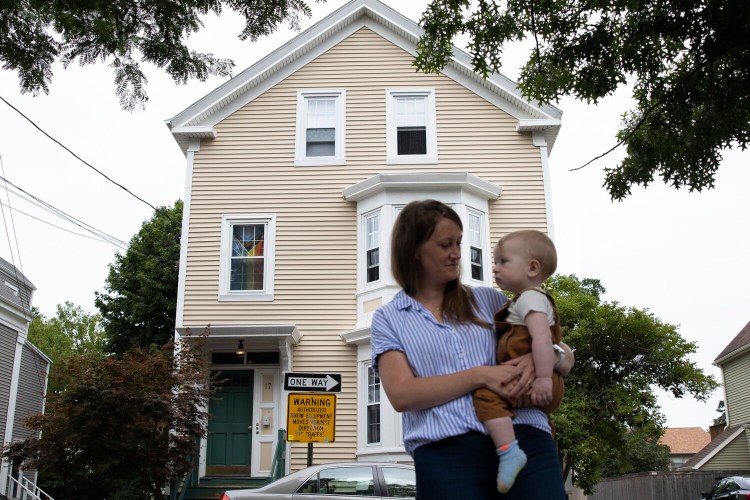Portland landlords are bracing for property tax increases that could lead to rent increases that will require approval from a new city board.
Like many property owners in Portland, some landlords are getting hit with higher property taxes due to the city’s first property revaluation in 15 years. A recently approved rent control ordinance also limits how much landlords can raise their tenants’ rent to offset those added costs. Many landlords are saying they would need to exceed those limits just to cover the higher property taxes caused by revaluation.
The new ordinance limits rent increases to 10 percent annually, and the hikes need to be based on increases in the cost of living, renovations to the property and higher property taxes. That means property owners need to give more thought to whether to seek a rent increase and what to base it on, said Kaili Moore, who owns Portland rental properties and also manages others’ rental properties through her company, Presumpscot Property Management.
“It’s a tricky line, and a lot of people are figuring out how to best navigate it,” Moore said.
The impact of higher property taxes due to revaluation adds another wrinkle to the new rent control ordinance, which was adopted by voters in a referendum in November.
A landlords’ group sued to block implementation of the ordinance, but that challenge was rejected this month by a Cumberland County Superior Court judge. Brit Vitalius, president of the Southern Maine Landlord Association, said his group and its lawyers are still weighing whether to appeal.
“Landlords are left (by the ordinance) with this mess and a lot of questions,” he said.
Because the ordinance limits rent increases to no more than 10 percent a year, Vitalius said, some landlords may decide to tie rent increases to property tax hikes more than they might have in the past.

The new median assessed value of a home in Portland is now estimated to be $365,000. Derek Davis/Staff Photographer
“This is going to fall on the tenants,” he said. “This tax increase is going to hurt tenants far more than any tax increase ever has. There will be this sense (among landlords) of, ‘I’ve got to get what I can.’ ”
If the full 10 percent increase is warranted from property taxes hikes alone, Vitalius said, landlords won’t be able to seek any other increase to cover rises in the cost of living and renovations.
To determine the new values, the city’s consultant, Tyler Technologies, looked at 45 months of sales data, from April 1, 2017, through Dec. 30, 2020, to determine full market values of more than 22,400 residential and commercial properties as of April 1.
The new median assessed value of a home in Portland is now estimated to be $365,000 – an increase of 52 percent over the previous median of $240,000.
Revaluations do not increase overall revenues to the city because the total amount of property taxes needed to be raised is set by the city budget. As a result, the overall increase in the city’s property values is expected to lower the property tax rate by 42 percent, from $23.31 per $1,000 of assessed value to a projected rate of $13.49 once the new assessments are in place. That rate will likely drop further because the state budget includes more aid for education and municipal services, some of which is being targeted for tax relief.
The overall citywide valuation – including both residential and commercial properties – is increasing 77 percent. That means taxpayers who see property values increase by more than 77 percent also will see their tax bills increase. Those with property values that increased by less than that will see their tax burden decrease.

Kim Sutton at one of her five rental buildings in Portland. Landlords are getting hit with higher taxes due to the city’s revaluation, and face new limits on how much they can raise rents. Derek Davis/Staff Photographer
Kim Sutton, who owns five buildings in Portland with about 20 rental units, said many landlords are feeling their way in the dark with the new rent control ordinance.
“We haven’t had a lot of clarification from the city,” she said, and the new rent board has only met a handful of times and has yet to elect officers.
Sutton said the new valuations on her properties have varied widely. All are increasing in value, but one building only increased by $700 while another one had its value increase enough that the annual property tax bill would have doubled to $18,000. She successfully appealed that valuation, but said the new value will still cause an increase in her property tax bill for that building from about $9,000 to $15,000.
If that leads her to a 10 percent rent increase based solely on property taxes, there’s no way for her to afford expensive renovations if she can’t recoup some of the costs through rent increases, Sutton said.
Moore, of Presumpscot Property Management, said that on average, taxes will be increasing about 48 percent on the buildings she owns along with the properties she manages.
Moore said she and most landlords try to manage expenses, including taxes, to avoid hitting tenants with big rent increases, but the tax increase she’s facing will make it difficult to do so.
“That’s a lot of money,” she said. “We work hard to keep things affordable for our tenants so that (the tax increase) impacts that.”
Moore said she and most landlords don’t operate with a big profit margin because the cost of upkeep and other expenses are high. Big property tax bills on top of that, she said, are going to be a factor at the same time landlords are wrestling with how to operate under the rent control ordinance.
“We’re still looking at our options,” she said. “It’s a challenging situation.”
Staff Writer Randy Billings contributed to this story.
Send questions/comments to the editors.




Comments are no longer available on this story